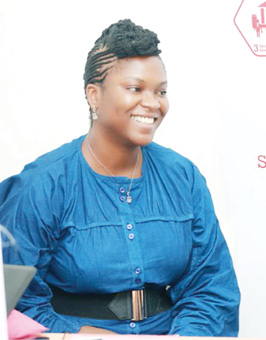Terfa Ashwe is the National Co-coordinator of SheTrades, a global initiative run by the International Trade Centre aimed at building capacity for women entrepreneurs. She spoke to Daily Trust about SheTrades’ Commonwealth Project at the sidelines of the 2018 annual conference of the African Women Entrepreneurship Programme (AWEP) held in Abuja recently.
Tell us more about SheTrades
SheTrades is a global initiative run by the International Trade Centre. The International Trade Centre is a joint organisation run by the United Nations and the World Trade Centre organisation. It was put together to improve competitiveness and integrate SMEs into the international market.
Under the women development programme, which is looking at the intersections between gender and trade, we have the SheTrades initiative. The idea behind SheTrades is this: We work on seven pillars, championing quality data on gender and trade, announcing policy on gender and trade, secure government contract and strike business deals, enable access to market and unlock financial service and grant ownership right to women businesses to improve the economic environment that will support women’s participation in the economy and also participation in international market. That is the SheTrades initiative itself.
In April this year, the UK government launched the SheTrades Commonwealth project and it is under that project that we have our country programmes, such as that run in Nigeria, which is also run in Ghana, Bangladesh and Kenya. Every country has its different sector focus, but in Nigeria, we focus on agriculture. We are focused on textile and apparel and we are also focused on services. Services make up about 60% of the economy in Nigeria so it’s important that we get more women participating there and empowered.
Under agriculture, we are focused on cashew, Shea and spices – ginger and turmeric. And in textiles and apparel, we also include handicraft.
In Nigeria, are you recording progress in your initiatives?
We are noting very good results. The project in Nigeria was launched in June and the kick-off project is in partnership with the Nigerian Export Promotion Council (NEPC), and we have started a lot of activities in terms of capacity building. Most of them have been online for now and most of the feedback we have been getting from the online courses have been encouraging. We just finished a course on analysing trade flows.
We have done courses on introduction to business planning. We have been doing entrepreneurship courses and we are getting feedback on them. We have a lot of women participating in the online courses, globally – that is in the four countries.
We have about 700 women who are signed-on. The target of the programme is about 3,000 women. In Nigeria, we are focused on building the capacity of at least 1,050 women. From the feedbacks, women are excited and happy about it.
We have been participating in trade fairs. We were at the Lagos Fashion Week a couple of weeks ago, talking about our brand.
How can women participate in your programmes?
All you need to do is go to our SheTrades platform and register. It’s a communal platform and you register at www.shetrades.com, then you apply to become a beneficiary. The criterion for being a beneficiary is that your company has to be 30% women owned and controlled by a woman. That is how we define it. It has to fall into the relevant sectors and it has to be registered in Nigeria.
We have noticed that we have a lot of women entrepreneurs in Nigeria doing things but they are not registered with the Corporate Affairs Commission (CAC). They are in the informal sector which makes it difficult to grow and expand in business, especially if you want to go into international trade. So you have to be registered in Nigeria.
What do women gain when they register on your platform?
When you are registered and you are accepted on the SheTrades platform, you are going to be tutored on 13 modules of business courses. That is like getting a free MBA. That is, courses on entrepreneurship, how to write a business plan, how to develop an export strategy, how to analyse the market, how to get cash flows.
These courses are what people go to the university to learn but you are getting it for free. It is a very educative and amazing training.
You will be in the network of fantastic women; women who are passionate about their work, women that know their business and you are able to network. During the Lagos Fashion Week, we were with a couple of women, and some were sharing their challenges on how difficult it is accessing finance; there and then someone with background in investment, offered explanation on what needed to be done.
So you key into this network of women that are coming from different backgrounds – law, banking and business – and they give you advice on how you navigate in the so-called complicated issues. You have keyed into a fantastic network.
The project is for two years, and we do understand that there is a limit to what we can do. All the women on the platform may not be able to attend this but we are going to be supporting women. People are at different levels in their businesses, some have just started up and need to go to the next stage, some have been at the middle stage and just need a little coaching to get their products ready for export. We will be putting them out for trade shows. We have women who are already export ready, we will be giving them extra coaching, mentoring and support in order to get them up there.
The start-ups have the information they need to have solid businesses/solid foundation so they know that even if they cannot export today, this is their plan, their strategy to export in say five/10 years. So they get a lot from the programme, and are excited about it.
It’s free. If you sign up, you get the modules every two weeks. We are almost at the end of the first cycle. The SheTrades programme ends in April 2020. So women have this opportunity till 2020. All they need to do is signup.
Are there financial benefits, like grants for women apart from the training?
We are not going to be giving out grants and loans. We will be creating investment opportunities. The idea of the project is to equip you to do what you are doing and to do it to the best quality. That is why we are connecting women to events; we take you there and you meet buyers. So far, we have been able to generate about US$2 million in sales leads, which means women went for events and met buyers who placed orders. I think this is better than grants and loans, because it is money that is coming into your pocket directly that you don’t have to pay back.
What is you view of Nigerian women entrepreneurs?
I think women entrepreneurs are dynamic people. Women in Nigeria are very creative in finding business solutions to problems. I think it is unique to the Nigerian woman. There are many things that a Nigerian entrepreneur balances; you have business you are thinking of, employees and then family to balance. It takes a lot of creativity and strength.

 Join Daily Trust WhatsApp Community For Quick Access To News and Happenings Around You.
Join Daily Trust WhatsApp Community For Quick Access To News and Happenings Around You.


